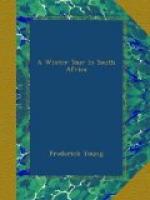in connection with the Royal Colonial Institute.
Sir Frederick Young is a man who has been content
to look after small things, and the result is
this Institute has been worked up by the individual
efforts of Colonists and others to its present flourishing
condition. I hope the Institute will long flourish,
and never be absorbed by anything under more magnificent
auspices—in other words, that you will
“paddle your own canoe.” It is
good sometimes to have a plain statement from a plain
man. South Africa suffers under a plague
of experts who, after spending a few weeks there,
tell us exactly what we ought to do; and we don’t
like it. I wish I could speak to you as
a sort of amiable critic, but I have the misfortune
to belong to that much-despised class the local politician,
and I notice that, when anybody says anything about
the Colonies in England, all unite in kicking
the local politician. In order not to sail
under false colours, I state frankly that I belong
to that class. Of course, South Africa is creating
a deal of interest at the present time.
People who come to fortunes usually do excite
a great deal of interest among relations who may in
times gone by have given them the cold shoulder.
There can be no doubt as to the material prosperity
of South Africa at the present time, and still
less doubt as to the future. The gold fields of
Witwatersrand are unique in the world. This
is not my own statement, but the statement of
eminent mining engineers from America. For thirty
miles and more you have a continuous stretch of
reef, which gives throughout a uniform yield
per ton, and which has been proved to the depth
of some hundred feet, and may—there is every
reason to believe—go to unknown depths.
The reefs are now being worked in the most economical
manner. When proper appliances for mining are
used, and when we get the stock-jobbers off our
backs, I believe a career of prosperity will
open of which few people dream. From another
point of view, to those who love the country and make
their home there, there cannot but be a seamy
side to the picture. Great wealth brings
other things in its train. It has brought into
South Africa a great spirit of gambling.
People neglect the honest industries of the country:
they leave their farm work, and rush off to make
fortunes in a minute. Everybody—from
the king to the beggar—is gambling
in gold shares. Everybody neglects his business,
and talks about nothing else. I ask whether this
is a wholesome state of society? Is it not
a state of society to which we may look with
some degree of apprehension? I believe myself
that things will work round, but, undoubtedly,
the state of affairs is serious. After all,
there is something which goes to build up a country
besides material wealth, and I am not sure that gambling
in gold shares is exactly the thing which is
wanted. Of course, there have been other
countries where these vast increases of material wealth
have occurred—California and Australia—but




